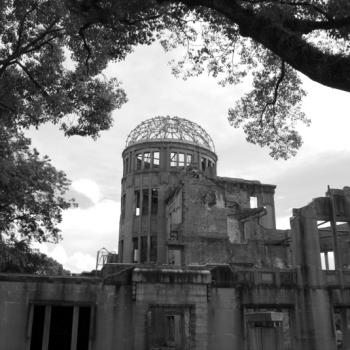A little over a year ago, Shawn of the blog Rerum Novarum issued a challenge to Catholics to debate him on the morality of the atomic bombings of Hiroshima and Nagasaki at the close of WWII (he was pro). I accepted the challenge, and we emailed back and forth about logistics, and I prepared an initial post setting out the against side of the question. Unfortunately the proposed debate never ended up happening, for reasons that I won’t go into now.
Since today is the anniversary of the bombing of Hiroshima, I thought I would post what would have been my initial contribution to the debate. As it is rather long, I have broken it up into two parts. During our email exchange, Shawn and I had agreed that, in order for the bombings to be justified from a Catholic perspective, it had to be the case both that:
1) the bombings did not involve the intentional targeting of civilians; and
2) the bombings saved lives, that is, any alternative course of action would have resulted in even greater loss of life.
This post addresses the first condition, and argues that the bombings did, in fact, involve the intentional targeting of civilians. In the second part, I will argue that the second condition, proportionality, was also not met.
It’s true that there were military targets in Hiroshima and Nagasaki, but this fact alone does not establish that the bombings did not target civilians. Suppose that we are in battle and you are taken captive by an enemy solder who is using you as a human shield. Unfortunately for him, I really dislike you and have been plotting your death for some time. I think to myself “Ah, here’s my chance to get rid of Shawn!” So I throw my hand grenade at you and kill you both. In this scenario, I have intentionally killed you. The fact that I also intentionally killed an enemy solder might provide a pretext for my action, but it doesn’t change the fact that I really did intend your death. Likewise, if the atom bomb was dropped on Hiroshima and Nagasaki with the purpose of killing civilians as well as enemy solders, then the fact that there was a military base in Hiroshima does not alter this fact, and will not serve to justify the bombing.
If we look at the minutes of the Target Committee meeting where the initial list of targets for the bombing were drawn up, we see that Hiroshima was selected as a bombing site not despite the civilian deaths that the bombing would cause, but specifically because of those deaths.
The meeting minutes state that “for the initial use of the weapon any small and strictly military objective should be located in a much larger area subject to blast damage in order to avoid undue risks of the weapon being lost due to bad placing of the bomb.” The minutes also cite Hiroshima as being a particularly good target because it “has the advantage of being such a size and with possible focusing from nearby mountains that a large fraction of the city may be destroyed.” Likewise, the Interim Committee, headed by Secretary of War Henry Stimson and created by President Truman to deal with the bomb planning, agreed in its May 1945 meeting that “the bomb be used without prior warning against Japan at earliest opportunity, the targets to be a military target surrounded by workers houses”
Far from being an unintended side effect, then, the death of a large number of civilians was part of the reason that Hiroshima was selected as a target site.
Now it’s true that President Truman did indicate in his diary entry for July 25, 1945 that the bomb was going to be used against a “purely military” target. It’s not clear to me whether this was a rationalization on Truman’s part, or whether he was duped or just didn’t comprehend what it was that the people who planned the bombing were telling him, but the entry is clearly not an accurate reflection of how the bombing occurred. Truman says that the target was “purely military” (which it wasn’t) and that the U.S. was going to “issue a warning statement” prior to the bombing (which it didn’t).
Personally, I’m inclined towards the dupe scenario. When Truman saw the photographs of the Hiroshima aftermath on August 10 (the day after Nagasaki), he ordered a halt to any further bombing, saying that he couldn’t bear the thought of killing “all those kids.” And in 1948, he discussed the matter with Atomic Energy Commission Chairman David Lilienthal, who quoted him as follows:
I don’t think we ought to use this thing [the A-Bomb] unless we absolutely have to. It is a terrible thing to order the use of something that (here he looked down at his desk, rather reflectively) that is so terribly destructive, destructive beyond anything we have ever had. You have got to understand that this isn’t a military weapon. (I shall never forget this particular expression). It is used to wipe out women and children and unarmed people, and not for military uses.
In any event, since Hiroshima was selected as a bombing target specifically because of the high number of civilian deaths that the bombing would cause, the first condition is not met.
UPDATE: References in the above post to “civilians” should refer to “noncombatants.” My apologies. Shawn, who was originally to be my interlocutor, offers responses here.
















